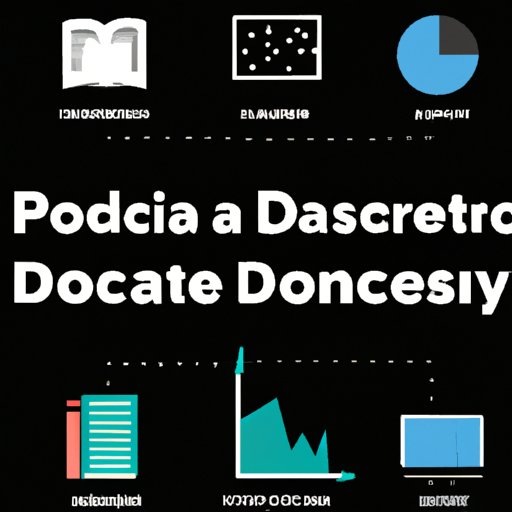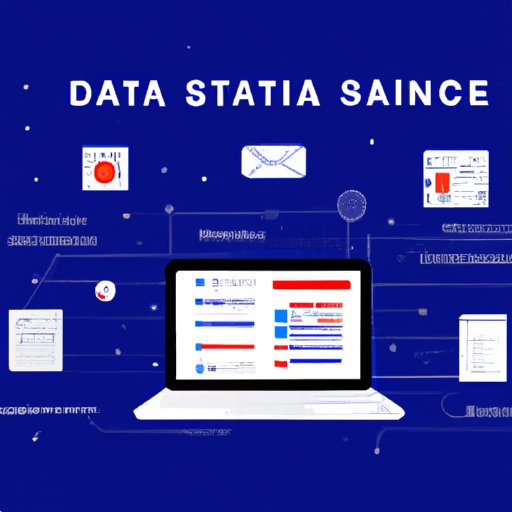Introduction
Computer data science is a field that combines computer science and statistics to analyze and interpret data. It has become an increasingly important tool for businesses, organizations, and individuals to gain insights from data and make informed decisions. In this article, we will explore the basics of computer data science, its components and applications, and the benefits of utilizing it.

Exploring the Basics of Computer Data Science
So what is computer data science? Put simply, it’s a process of collecting, storing, analyzing, and interpreting data to gain insights and draw conclusions. Data science is used to identify patterns, trends, and correlations in data sets to inform decisions and solve problems. There are many different types of data science, including machine learning, deep learning, natural language processing, and predictive analytics.
How can you use computer data science? By analyzing data sets, data scientists can uncover valuable insights that can be used to make more informed decisions. For example, data analysis can be used to develop new products or services, improve existing ones, or better understand customer behavior. Additionally, data science can be used to predict future trends, optimize processes, and identify areas for improvement.

A Comprehensive Guide to Computer Data Science
To understand how computer data science works, it’s important to first understand the different components of data science. The first component is data collection, which involves gathering data from various sources. The second component is data storage, which involves organizing and storing the data in a way that makes it easy to access and analyze. The third component is data analysis, which involves using algorithms and statistical methods to analyze the data. Finally, the fourth component is data interpretation, which involves interpreting the results of the analysis and drawing conclusions.
Once data is collected, stored, and analyzed, data scientists can then move on to applying data science techniques to uncover insights. These techniques include data mining, clustering, classification, regression, and time series analysis. Each technique is used to identify patterns, trends, and correlations in data sets that can be used to inform decisions or solve problems.
An Overview of Computer Data Science and Its Applications
Data science can be used in a variety of ways to help solve problems or make decisions. For example, data science can be used to predict customer demand or identify areas for improvement in a business process. Additionally, data science can be used to detect fraud or identify potential risks. Data science can also be used to optimize operations, such as supply chain management or inventory control.
Data science can be applied to many different fields, such as healthcare, finance, marketing, and manufacturing. In each field, data science can be used to gain insights and make more informed decisions. For example, in healthcare, data science can be used to analyze patient records and identify potential health issues. In finance, data science can be used to predict stock prices and identify investment opportunities. And in marketing, data science can be used to target customers with relevant advertisements.
Data science can also be used to create automated systems, such as chatbots or recommendation engines. Automated systems can be used to streamline processes, reduce costs, and improve customer service. Additionally, data science can be used to develop new products, such as virtual assistants or autonomous vehicles.

Introducing Computer Data Science: What You Need to Know
If you’re interested in learning data science, there are a few prerequisites to consider. First, you should have a basic understanding of computer programming languages, such as Python and R. Additionally, you should have a basic understanding of statistics and probability. Finally, you should be familiar with databases, such as SQL and NoSQL.
Once you have the necessary prerequisites, you’ll need to choose the right tools for data science. Popular tools include Jupyter Notebooks, Apache Spark, and Hadoop. Additionally, you can use cloud-based services, such as Amazon Web Services or Microsoft Azure. Each of these tools provides powerful features and capabilities for data science.
Finally, you’ll need to find resources for furthering your knowledge of data science. There are numerous online courses, tutorials, and books available to help you learn data science. Additionally, there are many online communities, such as Kaggle or Stack Overflow, where you can ask questions and get tips from experienced data scientists.
Understanding the Benefits of Computer Data Science
Data science has numerous benefits, particularly when it comes to decision making. By analyzing data, data scientists can identify patterns, trends, and correlations that can be used to make more informed decisions. Additionally, data science can help increase efficiency by automating processes and reducing manual labor. Finally, data science can help businesses save money by optimizing processes and identifying potential cost savings.
Conclusion
Computer data science is a powerful tool for businesses, organizations, and individuals to gain insights from data and make informed decisions. It combines computer science and statistics to analyze and interpret data sets. Data science can be used to identify patterns, trends, and correlations in data to inform decisions or solve problems. Additionally, data science can help businesses save money, increase efficiency, and improve decision making.
(Note: Is this article not meeting your expectations? Do you have knowledge or insights to share? Unlock new opportunities and expand your reach by joining our authors team. Click Registration to join us and share your expertise with our readers.)
